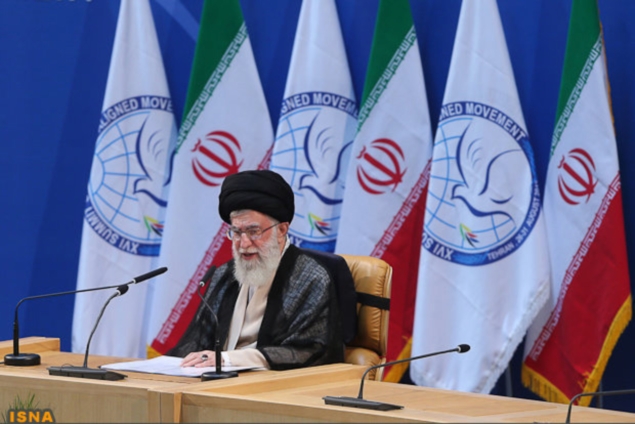- Home
- Social networking
- Social networking News
- Iran's supreme leader 'likes' Facebook
Iran's supreme leader 'likes' Facebook

Launched a few days ago, the Facebook page "Khamenei.ir" displays photographs of the 73-year-old cleric alongside speeches and pronouncements by the man who wields ultimate power in the Islamic Republic.
While there are several other Facebook pages already devoted to Khamenei, the new one whose number of "likes" quadrupled on Monday to over 1,000 appeared to be officially authorised, rather than merely the work of admirers.
The page has been publicised by a Twitter account of the same name that Iran experts believe is run by Khamenei's office.
Both U.S-based social media sites are blocked in Iran by a wide-reaching government censor but they are still commonly used by millions of Iranians who use special software to get around the ban.
In 2009, social media were a vital tool for those Iranians who believed the re-election of President Mahmoud Ahmadinejad was rigged. Facebook was used to help organise street protests of a scale not seen since the Islamic Revolution of 1979.
The protests which the government said were fuelled by Iran's foreign enemies were eventually stamped out by the security forces and their political figureheads remain under house arrest.
Khamenei's Facebook page has so far shared a picture of a young Khamenei alongside the founder of the Islamic Republic, Ayatollah Ruhollah Khomeini, in the early 1960s.
It shares a similar tone, style and content with accounts devoted to disseminating Khamenei's message on Twitter and Instagram and to the website www.khamenei.ir, a sophisticated official website published in 13 languages.
Experts said the social media accounts showed that Iran, despite restricting access to such sites inside the country, was keen to use them to spread its world view to a global audience.
"Social media gives the regime leadership another medium of communication, one that can share their message with a younger and far more international demographic," said Afshon Ostovar, a Middle East analyst at CNA, a U.S.-based research organisation.
Iran is locked in a decade-long dispute with the West over its nuclear programme, which the U.S. and its allies suspect is aimed at developing a bomb, something Iran has repeatedly denied. Iran, the West and regional states are also often opposed on issues such as the violence raging in Syria and the Israeli-Palestinian conflict.
Iranian authorities have said they are trying to build a national intranet, something sceptics say is a way to further control Iranians' access to the global web. Tehran tried to block Google Inc.'s email service this year but soon reopened access.
© Thomson Reuters 2012
Catch the latest from the Consumer Electronics Show on Gadgets 360, at our CES 2026 hub.
Related Stories
- Samsung Galaxy Unpacked 2025
- ChatGPT
- Redmi Note 14 Pro+
- iPhone 16
- Apple Vision Pro
- Oneplus 12
- OnePlus Nord CE 3 Lite 5G
- iPhone 13
- Xiaomi 14 Pro
- Oppo Find N3
- Tecno Spark Go (2023)
- Realme V30
- Best Phones Under 25000
- Samsung Galaxy S24 Series
- Cryptocurrency
- iQoo 12
- Samsung Galaxy S24 Ultra
- Giottus
- Samsung Galaxy Z Flip 5
- Apple 'Scary Fast'
- Housefull 5
- GoPro Hero 12 Black Review
- Invincible Season 2
- JioGlass
- HD Ready TV
- Laptop Under 50000
- Smartwatch Under 10000
- Latest Mobile Phones
- Compare Phones
- Honor Magic 8 RSR Porsche Design
- Honor Magic 8 Pro Air
- Infinix Note Edge
- Lava Blaze Duo 3
- Tecno Spark Go 3
- iQOO Z11 Turbo
- OPPO A6c
- Samsung Galaxy A07 5G
- Lenovo Yoga Slim 7x (2025)
- Lenovo Yoga Slim 7a
- Lenovo Idea Tab Plus
- Realme Pad 3
- Moto Watch
- Garmin Quatix 8 Pro
- Haier H5E Series
- Acerpure Nitro Z Series 100-inch QLED TV
- Asus ROG Ally
- Nintendo Switch Lite
- Haier 1.6 Ton 5 Star Inverter Split AC (HSU19G-MZAID5BN-INV)
- Haier 1.6 Ton 5 Star Inverter Split AC (HSU19G-MZAIM5BN-INV)
-
 Global RAM Shortage Is Reportedly Causing GPU, Storage Drive Prices to Skyrocket
Global RAM Shortage Is Reportedly Causing GPU, Storage Drive Prices to Skyrocket
-
 Viruses and Bacteria Evolve Differently in Space, ISS Study Finds
Viruses and Bacteria Evolve Differently in Space, ISS Study Finds
-
 Rockstar Games Said to Have Granted a Terminally Ill Fan's Wish to Play GTA 6
Rockstar Games Said to Have Granted a Terminally Ill Fan's Wish to Play GTA 6
-
 Oppo K15 Turbo Series Tipped to Feature Built-in Cooling Fans; Oppo K15 Pro Model Said to Get MediaTek Chipset
Oppo K15 Turbo Series Tipped to Feature Built-in Cooling Fans; Oppo K15 Pro Model Said to Get MediaTek Chipset






![[Sponsored] Haier C90 OLED TV | Dolby Vision IQ, 144Hz OLED and Google TV in Action](https://www.gadgets360.com/static/mobile/images/spacer.png)





